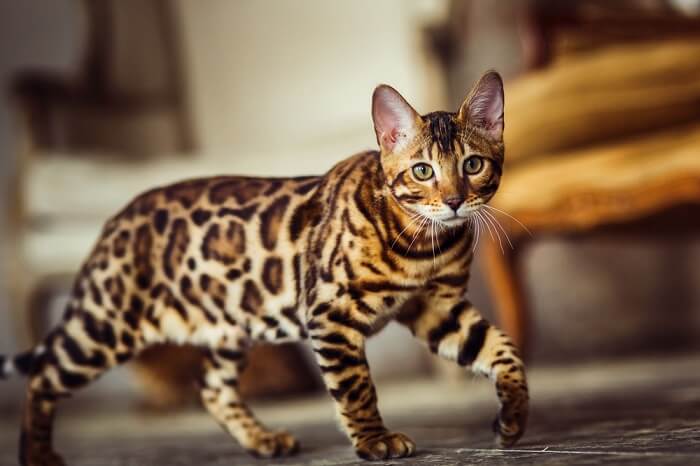
Cats are magnificent creatures by any account. Imagine owning a feline that took it a step further and looked like something straight from the wild.
Have you always dreamed of having a pet that looked like a sleek jaguar, a mini leopard cat or maybe even a ferocious tiger or another sort of big cat such as a Lynx?
Fortunately, owning a wildcat look alike is possible.
Dedicated breeders have spent years perfecting cross-breeding so that there are actually cats that look like leopards, but have the temperament of a domesticated cat.
Now, you don’t have to choose between a docile temperament or an exotic appearance. The following breeds prove that you can have both!
#1 Chausie
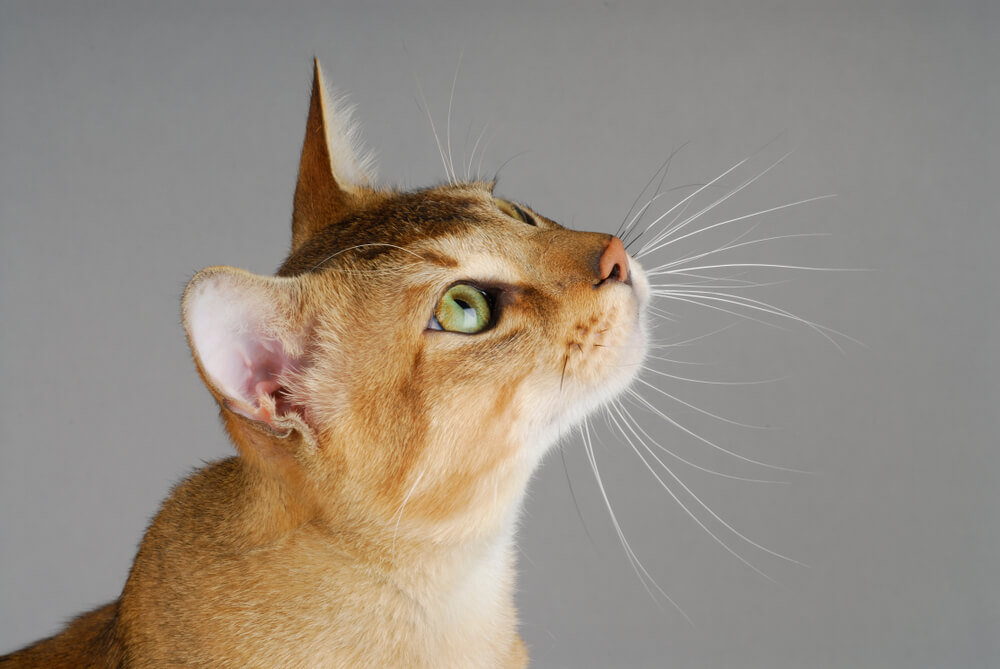
The Chausie breed is a hybrid of the Jungle Cat found in Asia. Their striking appearance, which looks like a miniature mountain lion, makes them prime choices for cat shows.
This is a very large breed. Some felines can reach up to 30 pounds, however the average weight is 18 pounds. It is important to note that first-generation males are usually infertile.
Keep in mind that a feral lineage comes with its challenge such as the fact that only fourth or fifth generations are considered good choices for pets or shows.
#2 Savannah
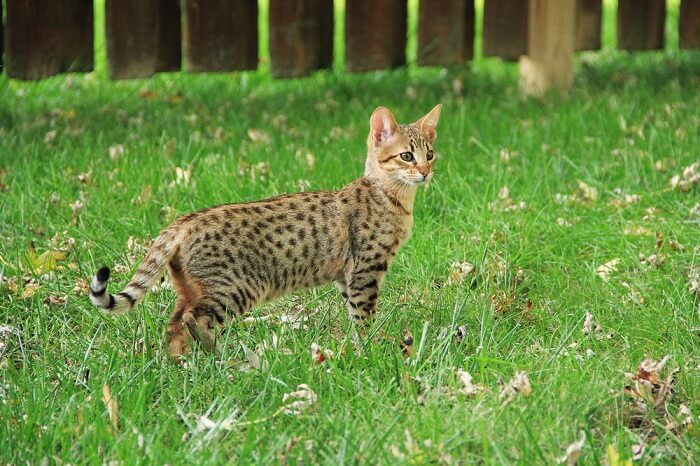
The Savannah is the crossing of an African Serval with a domestic housecat.
While they are not legal to own in all US states, they are highly sought after for their wild appearance.
It takes several generations for these cats to be domesticated and the first two generations of males are usually unable to reproduce.
This is the largest cat on the exotic-domestic breed list that you can own and is known for its ability to leap. They are also curious animals by nature and incredibly smart.
#3 Bengals
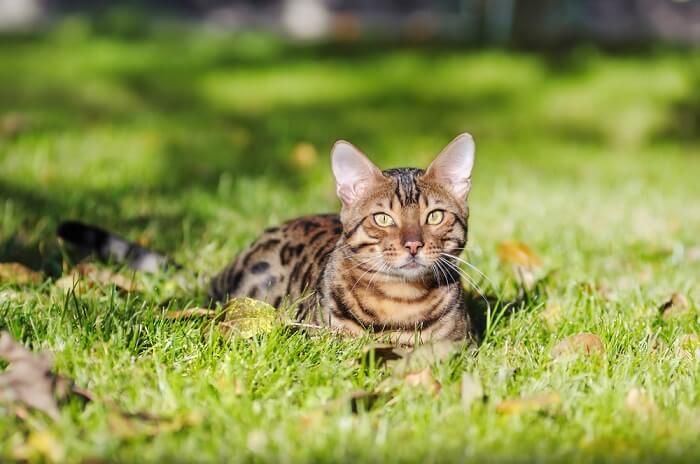
Bengals are heavy favorites among many cat owners.
They are probably the most established breed on this list. They are a cross between a domestic house cat and an Asian Leopard Cat.
F4 generations are known to make the best pets and used for showmanship. They are known for their striking markings and their athletic build.
#4 Ocicat
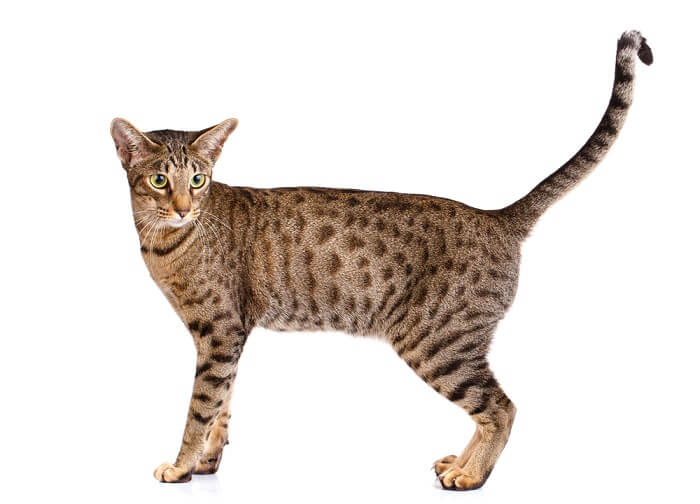
Ocicats are known for their spots that make them look like they belong in a jungle. However, the reality is that there is absolutely not direct lineage to a wild cat.
When the breed was first developed in 1964, it was due to the crossing of Abyssinian, Siamese, and American Shorthair.
What resulted was a beautiful feline with an ivory coat and the signature golden spots. The temperament of this particular breed is a playful extrovert.
Owners often describe these cats as dog-like and much more social than regular housecats.
#5 Toyger
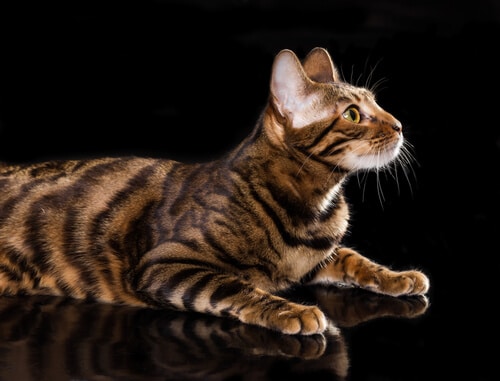
The Toyger is the closest any cat owner can get to a cat that resembles a tiger.
The breed is a cross between a Bengal and domestic shorthairs that are hand selected for their unique markings.
The creation of the breed began in the 80’s and has taken a while to perfect.
However, they are now gaining popularity among breeders and often participate in shows.
#6 Cheetoh
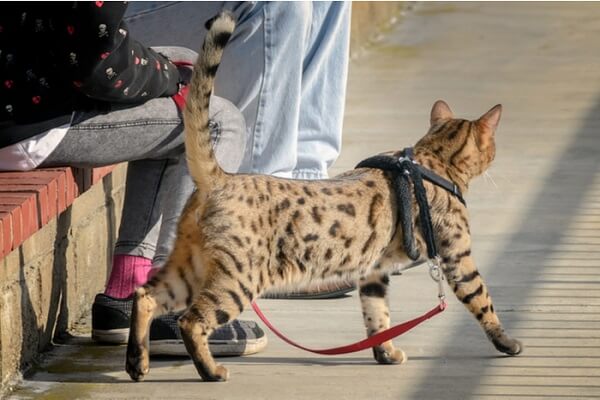
Looking for a cat that looks like a cheetah?
Look no further than the Cheetoh. This particular cat is a crossbreed of two other crossbreeds: Ocicat and Bengal.
The attempt here was to create a breed that looked even more mild, but was even more friendly. This experimental breed is fairly new as it only started in 2001.
However, it is determined that this breed is social and especially good with children. Keep in mind that this breed is large and can reach over 20 pounds.
#7 Serengeti
The interesting thing about the Serengeti breed was that it was the attempt to develop a breed that looked like Serval, but not actually have any Serval lineage.
This is a much different approach than most other breeds that would like the wild-cat look.
Most other breeds cross-breed with a tame and wild breed. Ultimately, the Bengal and Oriental Shorthair were used to create this stunning creature.
Other breeds have been used to create a similar look, but never a Serval. Overall, this breed is considered very active and likes to use its voice to communicate with its owner.
Final Thoughts
Whether you want a cat that looks like a cheetah or a cat that looks like a leopard—you can actually have it!
These cool cat breeds prove that with a bit of creativity and time, we can live with cats that look like they are straight from the wild without the worry of a hostile nature.
Plus, they are truly beautiful animals that are unlike any others.
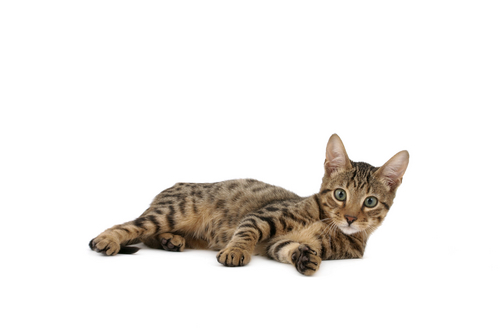
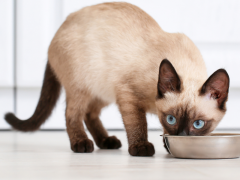
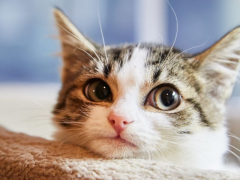
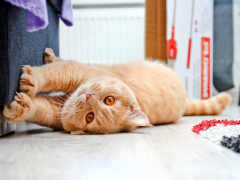
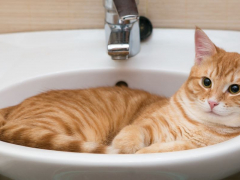
Love the look of the Bengal
Toyger looks like a lion to you but it looks like a little tiger to me. Also that Savannah is a Serval.
I love the Bengal Cat. By the way, where is the Bengal name came from Royal Bengal Tiger?
You never even touched on the Highland Lynx.They are a fantastic cat with a great personality,polydactyl paws,stubby tails & a great attitude.They can also reach 20 lbs without being overweight.
These all cat breeds are really amazing. I also have a Bengal cat in my home from 2 years. I really different cat breeds as a pet.
I think my cat is a Tabby- Ocicat mix.
My kitty is allegedly a Bengal , (she was given to us from a family member) she looks like a tabby to me!!! And I have papers that she was $1500 & bengal!!! Wondering if the person that purchased her was fooled into thinking it was a Bengal instead of Tabby!!! I love her either way!!
This is pure vanity. Why do people want to have exotic breeds when there are so many cats waiting to be adopted in animal lshelters? Most of them ended up being put to death.
I AGREE, wholeheartedly!
With as many as 90 million feral and abandoned cats in the USA and an estimated 1.9 billion throughout the world; with thousands of domestic cats being euthanized every month for lack of a home and thousands more living in unsanitary/ unsafe/ hoarding/ abusive and outdoor situations; with these cats’ devastating impact on wildlife: driving many critically endangered species of birds and reptiles to extinction, breeding ‘designer’ pet cats seems like a significant misdirection of energy.
Where can I get a bengal cat breed?
Hi Iris, this tool will help you to find a breeder near you: https://www.adoptapet.com/s/adopt-a-bengal
Hope this helps!
– Mallory
“Mini” Tigers,a novel idea….